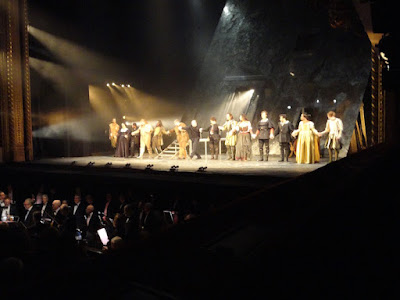(review in English below)
A opera Rigoletto de G Verdi esteve em cena na Royal
Opera House de Londres, numa reposição da encenação polemica de David McVicar. A récita a que assisti
foi dedicada à memoria do grande baritono russo Dmitri Hvorostovsky (originalmente anunciado para o papel de
Rigoletto) que morreu em Londres há poucas semanas. E que falta fez no
espectáculo, mas já lá iremos.
A encenação de
McVicar mostra a profunda corrupção, opulência e crueldade na corte de Mântua,
em contraste com a casa muito modesta, uma barraca, onde vive o Rigoletto com a
filha. O mesmo cenário é usado para a pensão do Sparafucile. A ópera abre com
uma enorme orgia com nus integrais, que apenas servem para chocar o público,
não trazendo nenhuma mais valia à obra.
A direcção
musical foi de Alexander Joel.
A grande maioria
dos solistas foi de qualidade superior, mas o principal não esteve à altura do
papel.
O barírono grego Dimitri Platanias esteve muito aquém
das exigências da personagem. Bem caracterizado, limitou-se a cantar sem
sentimento ou alma e, mesmo o canto, não impressionou. Baixa potencia, algo
monocórdico ao longo de toda a récita, não viveu nem transmitiu as emoções da
personagem. Foi uma pena. Para além de outros solistas de primeira categoria
(que o foram), um bom Rigoletto é essencial para o sucesso desta ópera e tal
não aconteceu. Como se homenageava Hvorostovsky (esse sim, excelente neste
papel), ainda foi pior. Mas Platanias terá feito o seu melhor, mas não chega
para catedrais da ópera como a Royal Opera House.
No extremo oposto
esteve a soprano russa Sofia Fomina
que foi uma Gilda espectacular. Cantou sempre afinada, voz muito bonita sobre a
orquestra, com agudos de qualidade superior e emitidos aparentemente sem
esforço. Também com uma excelente presença em palco.
Outros dois cantores de topo foram o baixo italiano Andrea Mastroni que fez um Sparafucile assustador de imponente voz cavernosa e a irmã Maddalena, a mezzo búlgara Nadia Krasteva, muito habituada ao papel e que tem vindo a evoluir positivamente na sua interpretação.
O tenor norte
americano Michael Fabiano foi um
Duque globalmente bom, com desempenho cénico decente e com uma voz de grande
nível embora não tenha mantido regularidade de emissão em toda a récita,
nomeadamente no início.
Nos papéis
secundários ouvimos Luís Gomes
(Matteo Borsa), Simon Shibambu
(Conde Ceprano), Francesca Chiejina
(Condessa Ceprano), Dominic Sedgwick (Marullo)
James Rutherford (Conde Monterone) e
Sarah Pring (Giovanna).
Um Rigoletto
quase sem Rigoletto!
***
RIGOLETTO,
Royal Opera House, London, December 2017
G Verdi's opera Rigoletto was on stage at the Royal Opera House in London, reviving David McVicar's controversial
production. The performance I attended was dedicated to the memory of the great
Russian baritone Dmitri Hvorostovsky
(originally scheduled for the role of Rigoletto) who died in London a few weeks
ago. And how he was missed in the performance, but we will go to it later on.
The staging
of McVicar shows the deep corruption, opulence and cruelty in the court of
Mantua, in contrast to the very modest house, a hut, where Rigoletto lives with
his daughter. The same scenario is used for Sparafucile's pension. The opera
opens with a huge orgy with nudes, which only serve to shock the audience,
bringing no added value to the work.
The musical
direction was by Alexander Joel.
The great
majority of the soloists was of superior quality, but the main one was not up
to the paper.
Greek
baritone Dimitri Platanias fell far
short of the character's demands. Well characterized, he simply sang without
feeling or soul and even the singing did not impress. Down powered, somehow
monotonous throughout the performance, he did not live nor transmitted the
emotions of the character. It was a pity. In addition to other top-class soloists,
a good Rigoletto is essential to the success of this opera and such has not
happened. As the performance was a tribute to Hvorostovsky (excellent in this
role), it was even worse. But Platanias should have done his best, but it is not
enough for opera cathedrals like the Royal Opera House.
At the
opposite extreme was Russian soprano Sofia
Fomina who was a spectacular Gilda. She always sang in tune, a very
beautiful voice and always over the orchestra, with high quality top notes,
seemingly effortlessly. She had also an excellent presence on stage.
Two other
top singers were Italian bass Andrea
Mastroni who made a frightening Sparafucile with an imposing cavernous
voice and his sister Maddalena, Bulgarian mezzo Nadia Krasteva, very used to the role and who has been developing
positively in its interpretation.
American
tenor Michael Fabiano was an overall
good Duke with a regular stage presence and with a top level voice although he
did not maintain regular emission throughout the performance, namely at the
beginning.
In the
secondary roles we heard Luís Gomes
(Matteo Borsa), Simon Shibambu
(Count Ceprano), Francesca Chiejina
(Countess Ceprano), Dominic Sedgwick
(Marullo) James Rutherford (Count
Monterone) and Sarah Pring
(Giovanna).
A Rigoletto
almost without a Rigoletto!
***





































